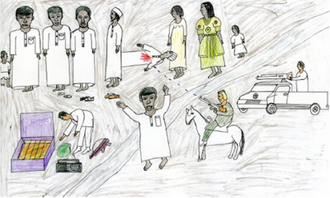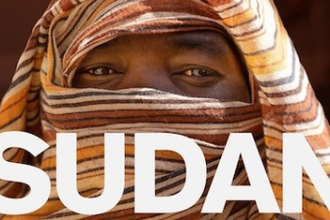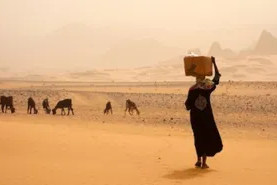Sudan: Aid agencies call for action 'before it is too late'

Sudanese child's drawing tells a graphic story
One year from the outbreak of fighting between the Sudanese Armed Forces (SAF) and Rapid Support Forces (RSF), representatives of humanitarian organisations working in Sudan and its neighbouring countries are sounding the alarm that Sudan is balancing on the precipice of one of the world's worst hunger crises, urging all actors to immediately scale-up efforts to prevent famine and avoid the potential loss of hundreds of thousands of lives.
Four months ago, more than 37% of the population - or at least 18 million people - were reported to be acutely food insecure (IPC3+), with nearly five million people on the brink of famine.
Since then the conflict, which is one of the main drivers of food insecurity, has expanded into traditional food-surplus areas, and as Sudan enters an early lean season, the situation is expected to deteriorate rapidly in the coming weeks, without immediate action.
Children and women are disproportionately and severely affected by the hunger and malnutrition emergency in Sudan and neighbouring countries. Already nearly four million children under five years old are acutely malnourished, of which 730,000 are projected to suffer from severe acute malnutrition. Women and girls are eating less and less nutritious foods than men and boys.
Approximately 1.2 million pregnant and breastfeeding women face acute malnutrition. As the food security situation worsens women also face additional protection challenges including intimate partner violence and sexual violence. With over 70% of health facilities shut down in conflict areas dropping child-vaccination coverage, limited access to services and looming disease outbreaks compounds the threats faced by these highly vulnerable groups.
The deteriorating hunger crisis unfolding today is the direct result of the conflict and a disregard for international humanitarian law and human rights law by all parties of the conflict. Sudan is rapidly becoming a stark illustration of conflict-induced hunger. Those facing the most acute food insecurity live in areas where violence has been most intense. Fighting has disrupted harvests and whilst markets continue to function in many locations, peoples purchasing power has plummeted and families forced to leave their homes and without income can simply not afford spiralling food prices. At the same time, access to humanitarian assistance continues to be severely restricted by administrative barriers, restrictions on civilian movement, lack of ports of entry in addition to insecurity, with the movements of essential supplies and personnel obstructed both into and within Sudan.
The crisis in Sudan also poses significant challenges to regional security and economic stability. More than 1.8 million people have fled Sudan since April 2023, with the majority seeking refuge in neighbouring countries - including Chad, South Sudan, Egypt, Ethiopia, and the Central African Republic - placing an incredible strain on already fragile countries with humanitarian crises of their own.
With famine looming, this number is likely to significantly increase as hunger drives people across international borders in search of food - often to areas that find themselves in dire food situations. On 15 February 2024, the Government of Chad declared a state of food and nutrition emergency, reflecting the urgency of the situation Almost 500,000 South Sudanese who had previously fled conflict and moved to Sudan have had no choice but to return, placing enormous strain on the pre-existing displacement crisis in South Sudan. What is at stake today is an entire region, from Red Sea to the Sahel.
Ahead of the 'International Humanitarian Conference for Sudan and its Neighbors' taking place in Paris, France, today, 15 April, organizations speaking at the briefing urged donors, UN agencies, as well as parties to the conflict-and their regional backers-to immediately facilitate a scaling-up of the humanitarian response. Conference participants must renew efforts to bring about an end to the hostilities through an immediate ceasefire and an inclusive peace process. In addition, NGOs call on those attending the Paris Conference to increase funding for all humanitarian actors, including local organisations and mutual aid groups, strengthen diplomatic pressure to push for the provision of unfettered humanitarian access, elevate efforts to address civilian violations, defend the critical role of local responders and enhance diplomatic and donor coordination on Sudan and the wider region.
Will Carter, the Norwegian Refugee Council's country director in Sudan, issued the following statement at the end of today's Paris conference:
"Today's conference was a genuine attempt to revive the world's efforts to help the victims of Sudan's brutal, neglected conflict. The funds pledged today are desperately needed to save millions of lives: they need to be made available immediately.
"The funding promised reached half the US$4 billion needed in Sudan and in neighbouring countries. Millions more people still risk dying of starvation or be forced to flee. Also, only half of the G20 states-the wealthiest economies in the world-are contributing. Where are the others?
"The test for the international community will be in the weeks and months to come. The words echoed today calling on warring parties to stop using aid as a weapon of war must be followed with continued diplomatic pressure for humanitarian aid. Far too many civilians are trapped in areas that we cannot quickly or safely reach as a result of aid obstruction.
"We need the international community's continued support to follow their words today with deeds to help open up humanitarian routes and overcome restrictions ahead of a looming, man-made famine."
LINKS
Last week a book of drawings by children caught up in twenty years of conflict in Sudan was launched in London. See: Survivors of Sudan's war to speak at London event www.indcatholicnews.com/news/49482
Waging Peace - The Children's Drawings: https://wagingpeace.info/our-work/the-childrens-drawings/
Waging Peace: https://wagingpeace.info
CAFOD in Sudan: http://80.87.133.146/About-us/Where-we-work/Africa/Sudan
Christian Aid, South Sudan: www.christianaid.org.uk/our-work/where-we-work/south-sudan


















